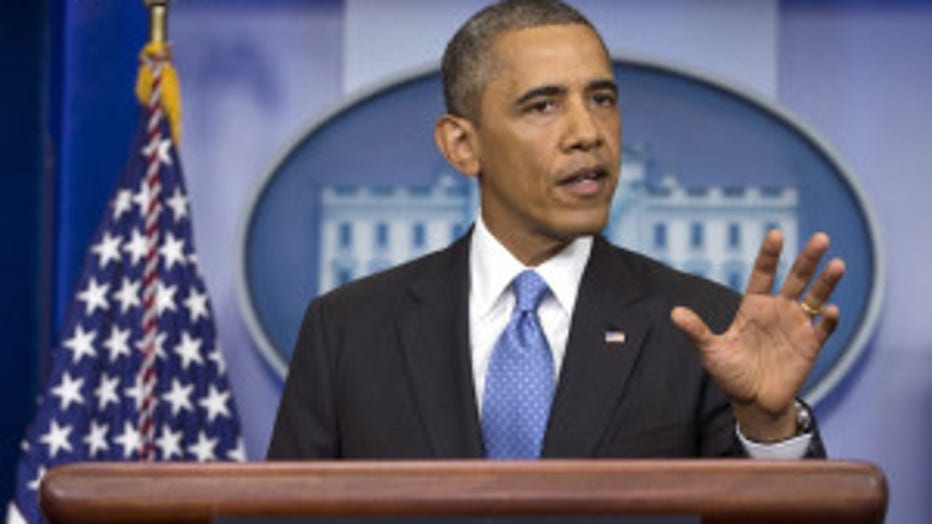Shutdown over: Obama signs bill reopening government, raising debt limit
[trib_ndn vid=25264624]
WASHINGTON (CNN) -- President Obama signed legislation early Thursday reopening the federal government after a 16-day closure and raising the U.S. debt limit, averting what would have been the first default in American history.
He signed the measure a couple hours after Congress passed it Wednesday night. Federal workers who were furloughed when government funding expired on Oct. 1 were told by the White House to report to work Thursday morning.
The Senate approved the legislation on an 81-18 vote Wednesday and sent it to the House, where Republican tea party members were still opposed to the measure.
But with a majority of Democratic votes, the Republican-controlled House late Wednesday night approved the Senate-passed bill. The vote was 285-144, with all 144 no votes from Republicans. All 198 Democrats who voted cast yes votes, and 87 Republicans joined them. Every member of Washington state's delegation voted to approve the bill, including Rep. Cathy McMorris Rodgers, chairwoman of the House Republican Conference.

Such quick congressional action on a measure announced earlier in the day was in stark contrast to the protracted brinksmanship of recent weeks that led to the shutdown now in its 16th day and brought the threat of default.
The agreement represented a victory for Obama and Democrats over conservative Republicans, who had tried to use the shutdown and debt ceiling deadline to wring concessions on spending cuts and dismantling the Obama's signature health care reforms.
However, the final deal worked out by Senate leaders after House Speaker John Boehner was unable to get his own Republican caucus to support a House GOP version lacked any substantive measures sought by the political right beyond extending current spending levels until Jan. 15.
"We fought the good fight; we just didn't win," Boehner told a radio station in his home state of Ohio in reference to GOP efforts to dismantle or defund Obama's signature health care reforms and extract deficit reduction concessions around the need to fund the government and raise the federal borrowing limit.
National polls conducted since the start of the shutdown on Oct. 1 indicate that while all sides are feeling the public's anger over the partisan political impasse, Republicans are getting blamed more than than Democrats or Obama.
Boehner and other House Republican leaders told their GOP caucus they would vote for the agreement at an afternoon meeting that participants said ended with a standing ovation for the embattled speaker.
"Blocking the bipartisan agreement reached today by the members of the Senate will not be a tactic for us," Boehner said in a statement. "Our drive to stop the train wreck that is the president's health care law will continue."
News of the deal brought some relief to Wall Street as well as Washington, where the shutdown reached a 16th day with the government poised to lose its ability to borrow more money to pay bills after Thursday.
Senate Majority Leader Harry Reid hailed the agreement he worked out with his GOP counterpart Mitch McConnell as "historic," saying that "in the end, political adversaries put aside their differences."
Obama praised Senate leaders for reaching a compromise, and urged Congress to act quickly, White House spokesman Jay Carney said.
"As soon as possible is essentially the recommendation we have from here," he said.
U.S. stocks rose on the news of an agreement, with the benchmark Dow Jones Industrial Average jumping more than 200 points on the day.
Reid said the deal also would raise the debt limit until Feb. 7 to avert a possible default on U.S. debt obligations for the first time.
It includes a provision to provide back pay to furloughed federal workers, leadership and congressional sources told CNN.
In addition, the White House supports a provision in the deal that strengthens verification measures for people getting subsidies under Obamacare, spokesman Jay Carney said.
Carney called the change "a modest adjustment," and said it didn't amount to "ransom" for raising the federal debt ceiling because both sides agreed to it and the White House supported it.
The Senate agreement also would set up budget negotiations between the House and Senate for a long-term spending plan.
McConnell fired an opening salvo for those talks, expected to begin soon and continue until December, when he said any ensuing budget deal should adhere to spending caps set in a 2011 law that included forced cuts known as sequestration.
"Preserving this law is critically important to the future of our country," McConnell said of the Budget Control Act, which resulted from the previous debt ceiling crisis in Washington.
The focus on an agreement shifted to the Senate after House Republicans failed on Tuesday to come up with a plan their majority could support, stymied again by demands from tea party conservatives for outcomes unacceptable to Obama and Senate Democrats, as well as some fellow Republicans.
Republican Sen. Kelly Ayotte of New Hampshire called the House GOP tactic of tying Obamacare to the shutdown legislation "an ill-conceived strategy from the beginning, not a winning strategy."
However, Republican Rep. Steve King of Iowa advocated continued brinksmanship to try to change Obamacare, which conservatives detest as a big-government overreach.
"If we're not willing to take a stand now, then when will we take this stand?" he told CNN, adding that if "the conservative Republican plan had been implemented five years ago, say at the inception of what is now the Obama presidency, we would have far less debt and deficit."

